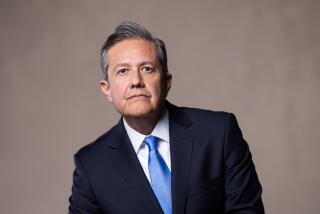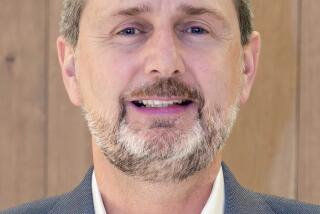Leader of Interfaith Council Charts New Path for Growth
- Share via
CHATSWORTH — With a $4-million yearly budget, the 33-year-old San Fernando Valley Interfaith Council runs an array of programs serving the homeless, the homebound, senior citizens and the disabled.
But despite its “interfaith” name, the council attracts relatively few religious groups from outside Judaism and Christianity.
However, the Rev. Jeffrey Utter, a United Church of Christ minister elected this week as council president for a two-year term, has a special interest in welcoming Muslims, Hindus, Buddhists and others to more religious dialogues and cooperative ventures.
Utter said that “addressing religious and cultural pluralism” is an important function for interfaith councils at a time when ethnic and spiritual groups are growing but are often relatively isolated from broader public life.
A graduate of Harvard and Columbia who has taught comparative religions at Cal State Northridge, Utter has moderated in recent years a series of council-sponsored public forums on topics from salvation and the afterlife to medical ethics. Representatives of Catholic, Protestant, Adventist, Jewish, Mormon and other faiths have appeared as panelists.
“Explicit discussions of the differences and similarities of beliefs help counteract misunderstandings or wrong assumptions,” said Utter, who was elected Wednesday to succeed the Rev. Dudley Chatman, pastor of Greater Community Missionary Baptist Church in Pacoima.
In annual observances, the council attempts to bring together a wide spectrum of clergy and laypeople to its annual Martin Luther King Jr. birthday service and its annual memorial service recalling the Holocaust and other genocidal events in history.
“We had this year’s genocide memorial at St. Peter Armenian Church in Van Nuys, and that gave us a contact in the Armenian community,” Utter said.
Yet, in any given year, the council may have only one Muslim, one Buddhist and one Hindu serving on the board of directors or somehow involved in council programs--despite the population growth in those communities in the Valley, Utter indicated.
“It depends partly on how ‘American’ they want to be--whether they relate to organizations outside their own,” Utter said. “We have to let them know we are here when they are ready.”
Utter said the council last fall helped organize with Hindu groups what may become an annual Gandhi Day, celebrating the birthday of the Indian exemplar of nonviolent struggle.
Some contacts between disparate religious and ethnic groups already take place in the Valley without any need for an interfaith council. That comes through the sharing of church facilities by small congregations that cannot afford to rent or buy their own building.
Utter is no stranger to that kind of arrangement. He has been pastor for nearly five years of the Congregational Church of Chatsworth, a 55-member church that rents its 140-seat sanctuary to three other small congregations each weekend.
A Seventh-day Adventist congregation worships there on Saturday mornings. The Covenant Faith Center, an independent evangelical congregation, and a Korean Presbyterian church worship there on Sundays--before and after, respectively, the host church’s services.
Many pastors observe, however, that the sharing of church facilities often involves little more than cordial but fleeting contact between landlord and tenant.
And promoting informative dialogues among different religious groups signals non-belief to some churchgoers. “I was called an atheist for the first time by someone who learned I was an official with Valley council,” Utter said.
Utter, 54, has been active in the United Church of Christ denomination and is currently a part-time chaplain at the Federal Metropolitan Detention Center in downtown Los Angeles.
*
Speaking about future Interfaith Council plans, Utter said that the organization--with 125 staffers, 3,000 volunteers and ties to 400 congregations--has a four-year plan to expand its social services, including the establishment of three more permanent disaster centers besides the one at Temple Kol Tikvah in Woodland Hills.
“Under Red Cross auspices, they train people how to react in case of an earthquake or other disaster and have a center well-stocked with medicine and other emergency supplies,” Utter said.
“The centerpiece of our plan--to put it bluntly--is to market ourselves better for fund-raising,” he said. “Government funds are much harder to come by than in the past, so we hope to attract corporate membership.”
The council offices might relocate after a decade in the extreme northwest corner of the Valley on the rustic grounds of Chatsworth United Methodist Church, he said.
In September, the council’s board, whose maximum size was recently reduced from 45 to 30 members, will start meeting at Temple Ner Maarav in Encino. “We’d like to find a more central location for our offices, too,” he said.
More to Read
Sign up for Essential California
The most important California stories and recommendations in your inbox every morning.
You may occasionally receive promotional content from the Los Angeles Times.












